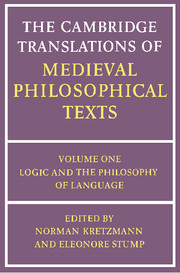Book contents
- Frontmatter
- Contents
- Preface
- General Introduction
- 1 BOETHIUS: On Division
- 2 Anonymous: Abbreviatio Montana
- 3 PETER OF SPAIN Predicables Categories
- 4 LAMBERT OF AUXERRE: Properties of Terms
- 5 Anonymous: Syncategoremata Monacensia
- 6 NICHOLAS OF PARIS: Syncategoremata (selections)
- 7 PETER OF SPAIN: Syllogisms; Topics; Fallacies (selections)
- 8 ROBERT KILWARDBY: The Nature of Logic; Dialectic and Demonstration
- 9 WALTER BURLEY: Consequences
- 10 WILLIAM OCKHAM: Modal Consequences
- 11 ALBERT OF SAXONY: Insolubles
- 12 WALTER BURLEY: Obligations (selections)
- 13 WILLIAM HEYTESBURY: The Compounded and Divided Senses
- 14 WILLIAM HEYTESBURY: The Verbs ‘Know’ and ‘Doubt’
- 15 BOETHIUS OF DACIA: The Sophisma ‘Every Man is of Necessity an Animal’
- Index
6 - NICHOLAS OF PARIS: Syncategoremata (selections)
Published online by Cambridge University Press: 05 June 2012
- Frontmatter
- Contents
- Preface
- General Introduction
- 1 BOETHIUS: On Division
- 2 Anonymous: Abbreviatio Montana
- 3 PETER OF SPAIN Predicables Categories
- 4 LAMBERT OF AUXERRE: Properties of Terms
- 5 Anonymous: Syncategoremata Monacensia
- 6 NICHOLAS OF PARIS: Syncategoremata (selections)
- 7 PETER OF SPAIN: Syllogisms; Topics; Fallacies (selections)
- 8 ROBERT KILWARDBY: The Nature of Logic; Dialectic and Demonstration
- 9 WALTER BURLEY: Consequences
- 10 WILLIAM OCKHAM: Modal Consequences
- 11 ALBERT OF SAXONY: Insolubles
- 12 WALTER BURLEY: Obligations (selections)
- 13 WILLIAM HEYTESBURY: The Compounded and Divided Senses
- 14 WILLIAM HEYTESBURY: The Verbs ‘Know’ and ‘Doubt’
- 15 BOETHIUS OF DACIA: The Sophisma ‘Every Man is of Necessity an Animal’
- Index
Summary
Introduction
Nicholas of Paris was a master of arts in Paris in the middle of the thirteenth century, but little more is known about him. In the hundred years from the last quarter of the twelfth century to the last quarter of the thirteenth, syncategorematic words were recognized as a special area of study and were discussed in treatises devoted exclusively to them. The Syncategoremata by Nicholas of Paris belongs to this period. (For some brief remarks on the distinction between categorematic and syncategorematic words, see the Introduction to Translation 5.)
In the selections translated here, Nicholas discusses two syncategorematic words, ‘whole’ and ‘besides.’ In his brief discussion of ‘whole,’ he is concerned with the supposition of expressions such as ‘the whole Socrates,’ with the basis for the inference ‘The whole Socrates is white; therefore, each part of Socrates is white,’ and with the grounds on which to distinguish this inference from the fallacious inference ‘The whole house costs a hundred marks; therefore, each part of the house costs a hundred marks.’ His discussion of ‘besides’ is much longer and quite complicated. ‘Besides’ is what medieval logicians called an exceptive word; that is, it takes something A from something B in respect of some third thing C. Nicholas's discussion of ‘besides’ includes a general consideration of the nature of exception and the rules associated with it. He analyzes a number of illustrative sophismata, such as ‘Every man sees every man besides himself.’
- Type
- Chapter
- Information
- The Cambridge Translations of Medieval Philosophical Texts , pp. 174 - 215Publisher: Cambridge University PressPrint publication year: 1989

